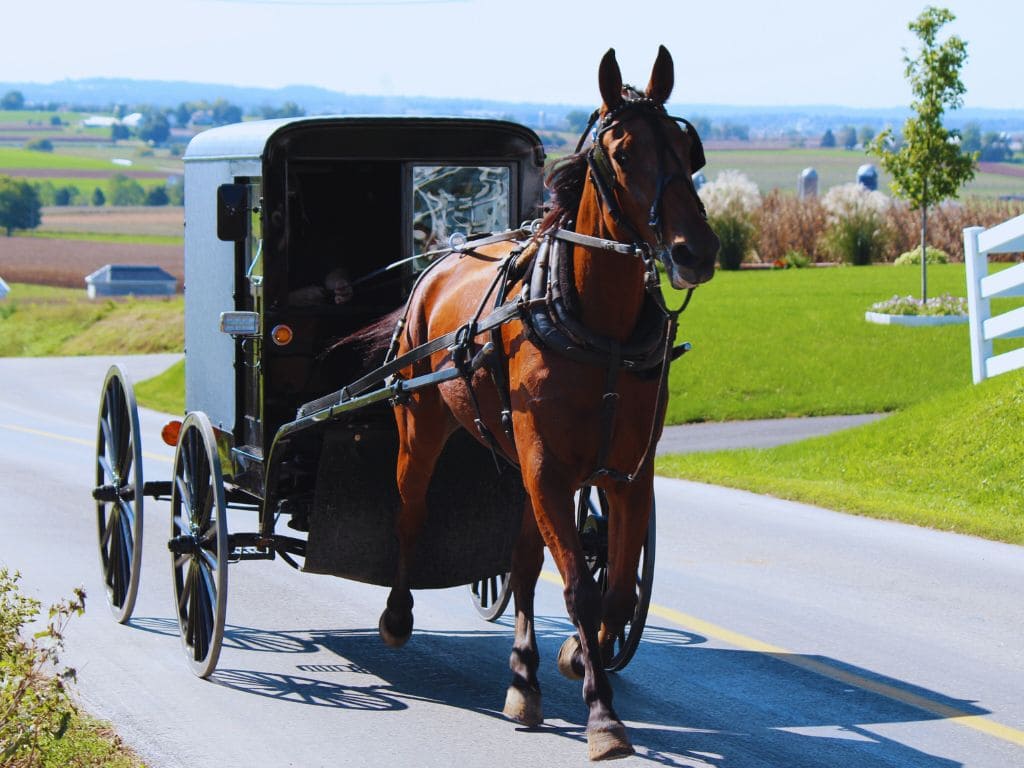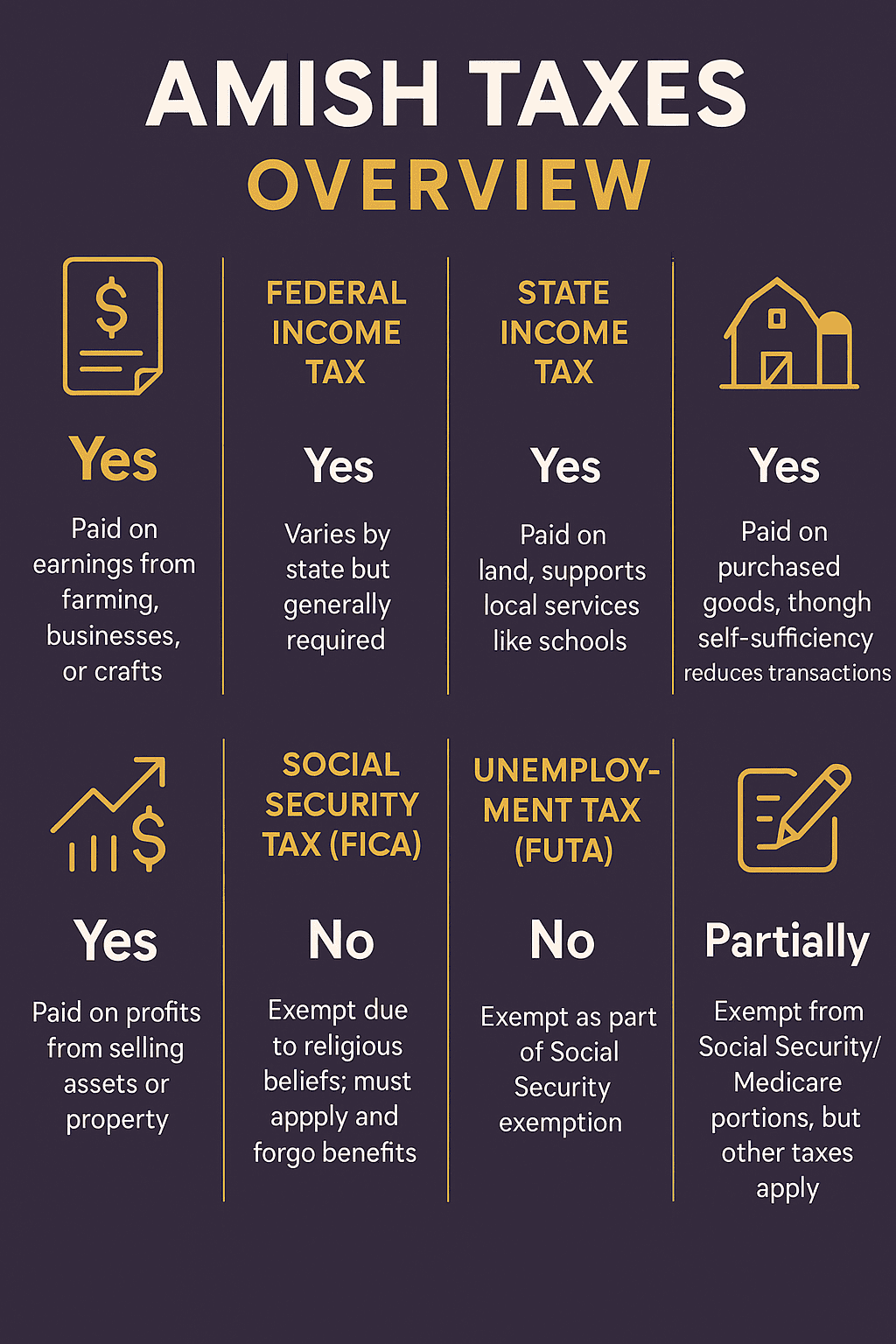Have you ever wondered, “Do Amish pay taxes?” It’s a question many ask when thinking about the Amish, a community known for their simple, traditional lifestyle. With their horse-drawn buggies and rejection of modern technology, it’s easy to assume they’re disconnected from government systems like taxation.
But the truth is more nuanced. The Amish do pay taxes, though their approach is shaped by their religious beliefs and community values. In this guide, you’ll learn how the Amish handle taxes, which taxes they pay, which they don’t, and why.
Let’s dive in to clear up myths and understand their unique financial responsibilities.
What’s Inside This Guide

Do Amish Pay Taxes? The Short Answer
Yes, the Amish pay taxes. They contribute to society through various taxes, just like most Americans. These include federal and state income taxes, property taxes, sales taxes, and capital gains taxes.
However, they are exempt from certain taxes, like Social Security taxes, due to their religious convictions. This balance reflects their commitment to civic duties while staying true to their faith.
Taxes the Amish Pay
The Amish pay several types of taxes, showing their role as responsible citizens. Here’s what you need to know about the taxes they pay.
Federal and State Income Taxes
Do the Amish pay taxes on their income? Absolutely. Whether they earn money from farming, crafting furniture, or running small businesses, their income is taxable.
They file federal and state income tax returns, just like you might. This ensures they contribute to government services, even if they don’t always use them.
Property Taxes
Many Amish own large plots of land for farming or community living. They pay property taxes on these lands, which fund local services like roads, schools, and libraries.
Interestingly, their property taxes support public schools, even though Amish children typically attend private Amish schools.
This shows their broader contribution to the community.
Sales Taxes
When the Amish buy goods or services, they pay sales taxes. For example, if they purchase tools or supplies from a local store, they’re charged sales tax like anyone else.
However, their focus on self-sufficiency means they may buy less, relying on bartering or community resources instead.
Capital Gains Taxes
If an Amish person sells land or assets at a profit, they pay capital gains taxes. This applies to any significant financial transactions, ensuring they meet federal tax obligations.

Fresh Amish onions for sale at a market, priced at 5 for $5
Taxes the Amish Are Exempt From
While the Amish pay most taxes, they are exempt from some due to their religious beliefs. Here’s a closer look.
Social Security Taxes
Are Amish tax exempt from Social Security? Yes, in many cases. The Amish are exempt from paying Social Security taxes, including FICA (Federal Insurance Contributions Act) taxes for Social Security and Medicare, and FUTA (Federal Unemployment Tax Act) taxes for unemployment benefits. Self-employed Amish are also exempt from Self-Employment taxes for these programs.
Why? The Amish believe in self-sufficiency and community support. They care for their elderly, disabled, and needy through church funds and mutual aid, not government programs.
To get this exemption, they must apply to the IRS using Form 4029 and agree not to accept Social Security or other government benefits. This exemption is supported by a Social Security Administration ruling that recognizes religious objections for groups like the Amish.
Other Minor Exemptions
The Amish have limited exposure to some taxes. For example, they don’t pay much in fuel taxes since they use horse-drawn buggies instead of cars. However, these exemptions are less significant compared to Social Security.
How Do the Amish Handle Taxes?
You might wonder how the Amish manage their taxes, given their simple lifestyle. It varies by community. Some Amish file their own tax returns, keeping detailed records of their income and expenses. In larger communities, Amish accountants or bookkeepers may help with tax preparation. Others hire outside accountants to ensure compliance with tax laws. Practices differ by state and community, but the Amish are diligent about meeting legal requirements.

Amish Village Barn Sign
Common Misconceptions About Amish Taxes
There’s a myth that the Amish don’t pay taxes at all. This likely comes from their distinct lifestyle and exemptions from certain taxes. But as you’ve seen, they pay most taxes other Americans do.
Their Social Security exemption is specific and tied to their faith, not a way to dodge responsibilities. Another misconception is that they burden society by not contributing.
In reality, their property taxes, income taxes, and other payments support public services, even if they don’t always use them.
Why Do Amish Pay Taxes Differently?
The Amish approach to taxes stems from their religious beliefs and community structure. They value separation from the modern world but respect government authority, as taught in their faith. Paying taxes is seen as part of being good citizens, but they seek exemptions where taxes conflict with their beliefs, like Social Security.
A key legal precedent, the Supreme Court case United States v. Lee (1982), upheld that the Amish must pay some taxes but also recognized their right to seek exemptions based on religious grounds.
This balance allows them to maintain their traditions while fulfilling civic duties.
Key Factors Influencing Amish Tax Practices
Several factors shape how the Amish handle taxes:
- Religious Beliefs: Their faith emphasizes self-reliance and community care, leading to exemptions like Social Security.
- Community Size: Larger communities may have Amish accountants, while smaller ones rely on individuals or outside help.
- State Laws: Tax requirements vary by state, affecting how Amish communities file and pay.
- Economic Activities: Their income sources, like farming or small businesses, determine their tax obligations.
Amish Taxes Overview

Amish Taxes Overview
FAQ: Common Questions About Amish Taxes
Do the Amish pay income taxes?
Yes, they pay federal and state income taxes on their earnings, just like most Americans.
Are Amish tax exempt from all taxes?
No, they’re only exempt from specific taxes, like Social Security, due to religious beliefs.
How do the Amish file their taxes?
Some file their own taxes, while others use Amish or outside accountants, depending on the community.
Why don’t the Amish pay Social Security taxes?
Their faith emphasizes community support over government programs, so they apply for exemptions and forgo benefits.
Key Takeaways
- The Amish pay most taxes, including income, property, sales, and capital gains taxes.
- They are exempt from Social Security taxes due to religious beliefs in self-sufficiency.
- Exemptions require an IRS application and a commitment to avoid government benefits.
- Misconceptions about the Amish not paying taxes are false; they contribute significantly to society.
Balancing Faith and Civic Duty
So, do Amish pay taxes? Yes, they do, and they play a vital role in supporting their communities through various taxes. While their exemptions from Social Security taxes make their approach unique, these are rooted in deeply held beliefs about self-reliance and community care.
By paying most taxes and respecting tax laws, the Amish show their commitment to being responsible citizens while staying true to their faith. This guide has cleared up myths and provided a clear picture of their financial responsibilities.
If you’re curious about other aspects of Amish life, let their balance of tradition and duty inspire you to learn more.